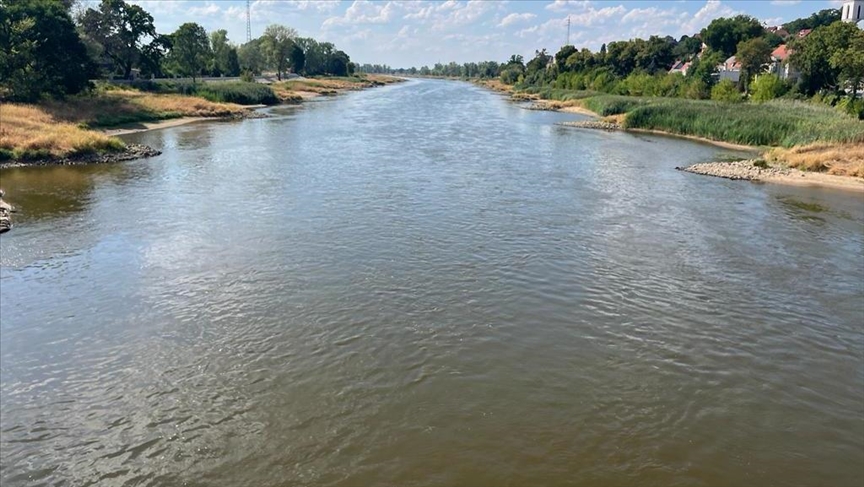Something fishy in Oder River along Polish-German border
Ecological crisis on river has already killed several thousand fish and is now killing other animals

KROSNO ODRZANSKIE, Poland
Andrzej Kobuszewski wanders over a bridge from one side of his sleepy town to the other. The fish have now gone, he says with a smile. The sun beats down on the bucolic scene, as if from a dreamy 19th century watercolor.
Clutching his beer bottle empties to his chest, Andrzej says the dead fish just floated into town one day.
“They just appeared, as if from nowhere, like an omen,” he says. “Then they left.”

The authorities in the Polish town of Krosno Odrzanskie, about 10 kilometers (6.2 miles) from the German border, apparently came in early one morning and cleared the masses of rotting fish away.
“They probably burned it,” Andrzej says.
The search for Poland’s dead fish is clearly not going to be as simple as we had expected, 51 kilometers downstream through a landscape sprinkled with farm animals and Prussian churches, forests and swampland to the Polish border town of Slubice, where a bridge separates EU neighbors Poland and Germany.
On the Polish side of the border overlooking the river, there are no fish to be seen. In fact, there is not much water in the river, the drought taking its toll.
The radio says that parts of the river are already cleared of dead fish.
I ask the local pizza parlor what happened to all the dead fish. “Is that a new restaurant?” she laughs. But I am not sure she is joking.
On the Frankfurt-on-Oder side of the bridge, German police sit in a baking hot police van. “We heard about some fish, but we don't know much about it,” one of them says when asked.
“You’d better ask the Polish side.”

The search for the dead fish is getting nowhere.
I enter the first store across the bridge on the Polish side, in search of water and some shade. I mention something offhand about dead fish to the lady serving me, expecting a shrug.
“I don't know, but I know someone who will,” she says, picking up her phone and calling. “He’ll be here in five minutes,” she says.
Five minutes later, and Mariusz arrives. He shows me pictures on his phone of masses of fish on the city’s river banks.
“This was last week,” he says. “Today, they are gone from here. But I can show you the effects up river if you like,” he adds, before departing in search of a scooter and helmet with which to escort me into the depths of the Oder’s lush riverside undergrowth.
We drive -- me in a car, Mariusz on a scooter -- along increasingly narrow and decreasingly asphalted roads and then tracks. Then suddenly we dart off the track. He jumps off his scooter and beckons me into the jungle.
Immediately we come upon a dead beaver.
“A baby,” he says.
The smell is awful. Mariusz looks for the beaver’s home, but to no avail.
“When the fish started dying, we all cried here,” he says.
Mariusz works in Germany but has fished on the Polish side all his life.
“It will take 10-15 years to clean up the river. Last month, people were swimming here,” he says, as we move on from the poor decaying beaver.
A few steps further, and a deer carcass lies before us. Mariusz says it was alive the day before, when he last visited the area.
Mariusz is genuinely angry and upset by what is happening.

“It’s grotesque,” he says. “And our government is not telling us all of what happened. It’s a little suspicious. Most of us think it was a Polish state-owned heavy industrial firm leaking toxic waste, and that would be on the government.”
Frogs continue to hop around the ponds that dot the swampland and a family of swans glides by. For now, they have survived.
Beavers and deer also depend on the waters of Poland’s second longest river and are in danger, locals say.
Poland is reluctant to acknowledge wrongdoing, but many local people believe the deaths are the result of leakages from a state-owned firm probably in Poland.
Meanwhile, Polish and German fishermen and tourists await answers.
Anadolu Agency website contains only a portion of the news stories offered to subscribers in the AA News Broadcasting System (HAS), and in summarized form. Please contact us for subscription options.







